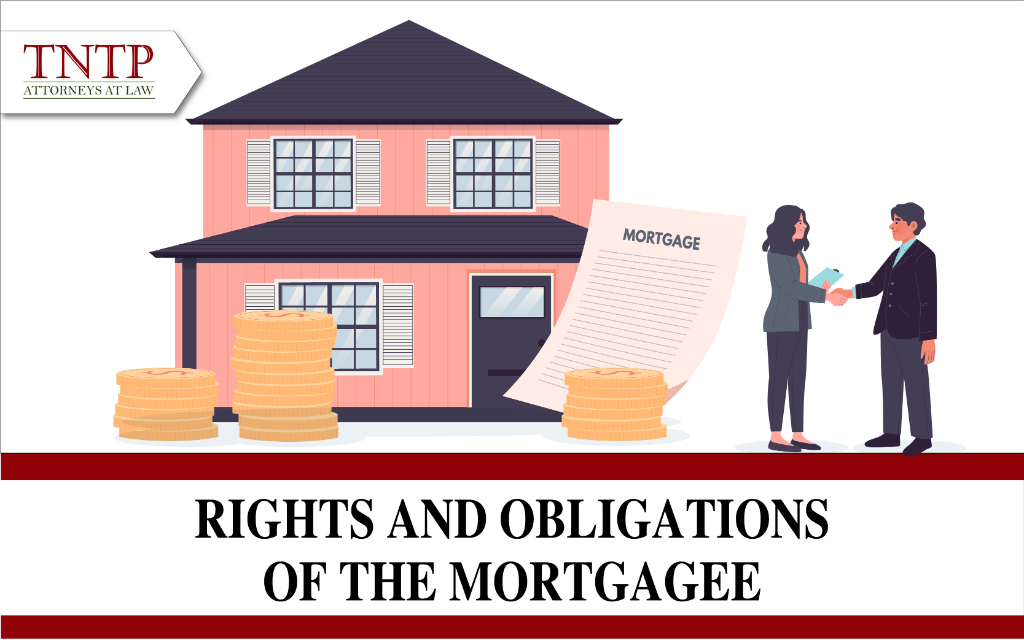Rights and Obligations of the Mortgagee in Property Mortgage

To ensure the performance of obligations in a contract, one of the measures often chosen by parties is Property Mortgage. Property Mortgage has common characteristics with other methods of securing obligations, such as enhancing the responsibilities of the parties regarding their commitments and supplementary obligations. To help parties apply this measure in accordance with legal regulations, in this article, TNTP will present an important aspect that all parties should pay attention to: the Rights and Obligations of the Mortgagee in Property Mortgage.
1. Rights of the Mortgagee
The mortgagee in Property Mortgage has the following rights:
• Examine and inspect directly the mortgaged property provided that such examination and inspection does not hinder or cause difficulty to the use and exploitation of the mortgaged property.
• Require the mortgagor to provide information on the current status of the mortgaged property.
• Require the mortgagor to apply necessary measures to preserve the property and the value of the property if there is a danger that use and exploitation of the mortgaged property will cause loss of value or depreciation in the value of the property.
• Conduct the registration of mortgage as prescribed by law.
Registering the mortgage in accordance with legal regulations is the obligation of the mortgagee if the mortgage measure falls under the cases mandated by the law to be registered as a secured transaction. On the other hand, registering the mortgage is also the right of the mortgagee because only when the mortgage is registered as per legal regulations does it gain enforceability against third parties. From that point onward, the mortgagee has the right to claim the mortgaged property from the possessor and is entitled to establish the priority order for payment when handling the mortgaged property.
• Require the mortgagor or a third person holding the mortgaged property to deliver it to the mortgagee for realization if, upon expiry of the term for the fulfilment of the obligation, the obligor has failed to perform or performed incorrectly the obligation.
• Hold documents related to mortgaged property as agreed by parties, unless otherwise prescribed by law.
• Follow procedures for realization of a mortgaged property as prescribed in the cases: i) An obligator fails to perform or perform not as agreed an obligation when it falls due; ii) An obligator must perform the secured obligation before the time limit due to his/her violation against the obligation as agreed or prescribed by law; iii) Other cases as agreed by the parties or prescribed by law.
2. Obligations of the Mortgagee
The mortgagee has the following obligations:
• Return the documents to the mortgagee after the termination of the mortgage in cases where the parties have an agreement, except when the law specifies otherwise.
Although the law only stipulates that a mortgage is the “use of property” and does not require the mortgagor to transfer documents related to the mortgaged property, in practice, the mortgagee often requests the mortgagor to transfer such documents regarding the mortgaged property. This transfer of documents helps the mortgagee prevent the mortgagor from transferring ownership rights to the mortgaged property. In cases where the mortgagee holds documents related to the mortgaged property, the mortgagee has an obligation to return these documents to the mortgagor when the mortgage is terminated.
• Follow procedures for the realization of mortgaged property in accordance with regulations of law.
Realization of mortgaged property is both a right and an obligation of the mortgagee. However, when carrying out this process, the mortgagee must comply with the procedures and regulations prescribed by the law.
This article, “Rights and Obligations of the Mortgagee in Property Mortgage” is provided by TNTP for your reference. If you have any questions or need further clarification, please feel free to contact TNTP for timely assistance.
Sincerely,


